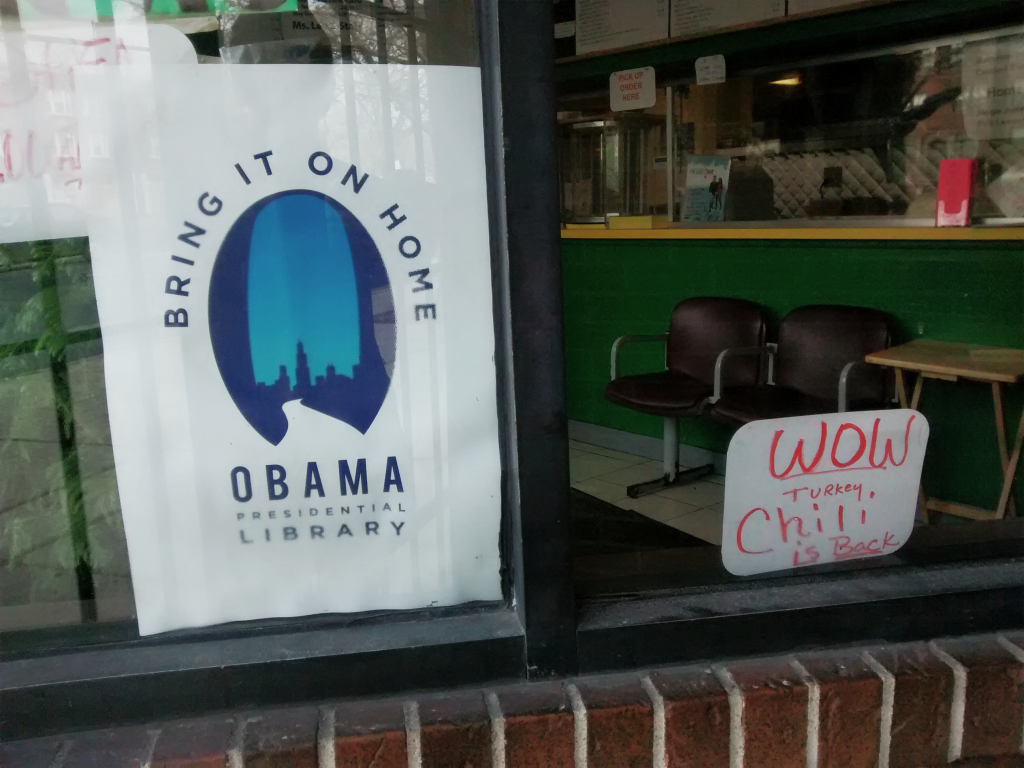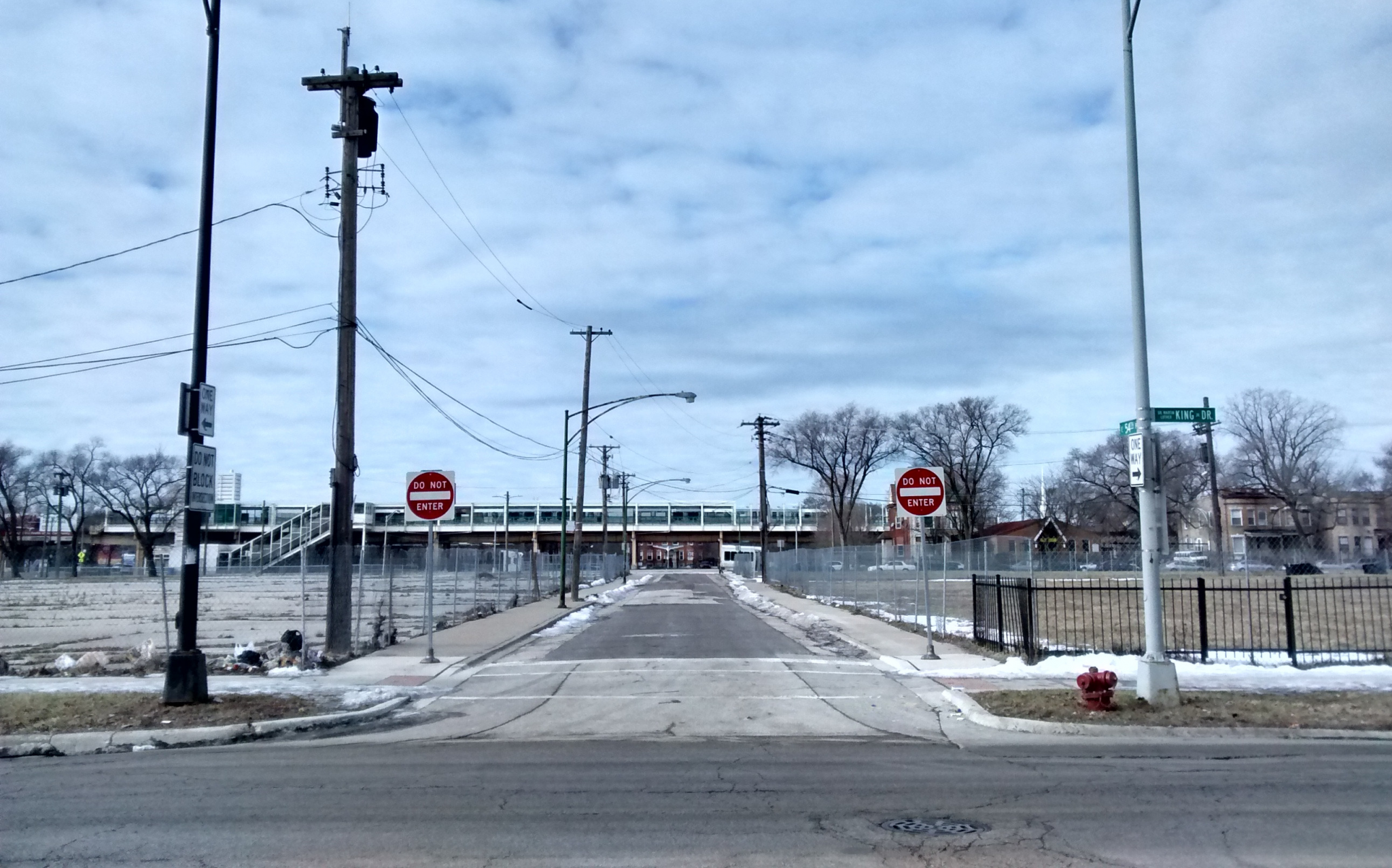Even before Rev. Dr. Leon Finney rose up to speak in support of a presidential library at the first of two public hearings last week, members of the audience, scattered across the packed auditorium at Hyde Park Academy, stood and cheered for him. The well-known South Side pastor began his speech softly, slowly swelling into a booming voice, until halfway through his allotted two minutes, the rest of the audience arose from its lethargy and hundreds of people in dark blue t-shirts emblazoned with the slogan “Bring it on Home” stood up to voice their full-throated, rapturous support. Ending with the words, “It’s time to bring President Obama back to Chicago,” Finney’s was a dazzling display of choreography that worked to its fullest effect; when the next speaker came up, he quipped, “Well, I don’t know if I can follow that.”
Rev. Finney is not officially affiliated with the University of Chicago’s bid; he is not even a member of the Community Advisory Board the school put together to aid in its creation. Nevertheless, he is one of countless community leaders who have thrown their support behind the bid as the UofC quietly organizes for the library behind the scenes. Over the course of the past year, the school has created an extensive campaign of support for its two bid sites in and around Jackson Park and—less controversially—Washington Park. With the help of Carol Adams, former president of the DuSable Museum and a member of the aforementioned board, the UofC has produced countless videos of local residents cheerfully reciting “Bring it on Home,” even enlisting renowned local rapper Rhymefest to perform a minute-long freestyle in favor of the library.
The impression this campaign creates is one of a grassroots effort spontaneously emerging out of the surrounding neighborhoods. The hearings, meant to solicit community input on the specific issue of using public parkland, often seemed more like an opportunity for local leadership to drum up an emotional defense of the library that would further confirm a vision of unequivocal support (the UofC touted the hearings as a chance to “come out and show your support” for the proposal). The reality, of course, is more complex. Among many residents who fully support the idea of a library, there still exists a deep unease, rooted in a worrying institutional history, about the potential consequences of such a change.
“The developers are coming in, and it’s not going to be affordable for people living here,” says Alfredia Little, assistant program director at the Washington Park center of the Chicago Youth Programs, an organization dedicated to providing programs for youth. Little was raised in the Washington Park neighborhood and recalls using the parkland as a child.
“I might want to move back in if it becomes a great neighborhood,” she continued. “People are afraid. A lot of people that have been living around here for years are afraid of losing their properties. But I think it’s a great thing. I really do.”

The UofC has a long legacy of harmful expansion into neighboring areas. In the mid-twentieth century, it enacted and encouraged policies to remove African Americans from Hyde Park and prevent more from moving in. Those policies resulted in the current disparities between the area immediately surrounding the UofC campus and the neighborhood just west across Washington Park, one of the poorest neighborhoods in the city. As of 2010, the median income in the neighborhood was just over $21,000, less than half the city average.
In the 1960s, Woodlawn residents made the University pledge not to build south of 61st Street, for fear of the type of urban renewal that had completely transformed Hyde Park in the preceding decade. Though it operates a charter school on 63rd Street, the University is still committed to honoring that pledge, according to Jeremy Manier, the UofC’s news director. As it happens, The Woodlawn Organization, one of the groups that led the anti-University effort, was headed in the 1960s by Rev. Finney.
People still distrust the University and its capacity for expansion. At the public hearing, one older man stood up and told the audience, “The University of Chicago has historically not been a good neighbor. Colored folks, Negroes, blacks, whatever you may call it, the University of Chicago won’t give you anything. Don’t trust the University of Chicago.”
Younger members of the neighborhood sense some of this animosity. “I think a lot of the people who are opposed to development have been here for generations, and they don’t think that people like them will be able to afford to live here if it gets a lot better,” said Emmiko Beathea, who moved into Washington Park two years ago, while walking in the park. “[The library] is a good thing for the community. It’s good for the less privileged and the more privileged.”
“When parts of the neighborhood are gentrified, you’ll be displaced, and they’ll tell you, ‘Come back later,’” said Ernest Tucker, who lives just north of Washington Park, while walking his dog on parkland. “What’s the purpose? Who can afford to stay there?”
While the UofC has been relatively covert with the more specific details of its bid, its extensive marketing of the proposal as a locally supported boon for the surrounding neighborhoods stands in contrast to the approaches of other universities vying for the project. Neither Columbia University nor the University of Hawaii have public websites for their bids, while the University of Illinois at Chicago, in an attempt to partner with the neighborhood of North Lawndale, has adopted the slogan, “A shared destiny of transformation,” and released the full details of its bid to the public. In this context, the UofC’s public relations push is more understandable: it is the only contender that seems to have to sell its bid not only to the President, but to the residents of the neighborhoods that could end up housing the library.
The UofC has, however, garnered the staunch support of Mayor Rahm Emanuel. In late December, it was leaked that the library foundation had concerns with the UofC bid’s reliance on parkland it did not own. Emanuel has worked hard in the past weeks to ensure that the parkland is made available for the bid as quickly as possible, recently sending a formal land transfer ordinance to the city council. Curiously, Emanuel has done little to address what those same leaks said was holding back the UIC bid—the uncertainty of recent administrative leadership—though the school’s incoming administration recently released a letter confirming its “unequivocal support” for the bid.
If the UofC’s Washington Park bid goes through using public parkland, it stands to profit from development on the six acres of vacant land the UofC owns across from the park, which it began to acquire (along with the land that the Arts Incubator now occupies) a couple of years ago, in preparation for the failed 2016 Olympic bid.
Manier says that the University made a total of about eleven acres of contiguous land available across from the parkland in its bid (apart from the land the school owns there were also parcels made available by both the city and CTA). The belief that so much space was necessary stemmed from a study of existing presidential libraries, which tend to have a three- to five-acre building at their center surrounded by twenty to twenty-five acres of open space, although the Kennedy Library, in Boston, consists of a three-acre building on a lot of just ten acres, and the Columbia bid would place the Obama Library on a Manhattanville satellite campus that is, in its entirety, only seventeen acres. Manier declined to comment on the comparison to the Kennedy Library, but said that the UofC feels that building on the parkland will make its bid more competitive as well as minimize the effect of the building on local residents. The UofC has also promised a net gain of parkland after the entire project is finished, although Emanuel has said the city would not necessarily hold itself or the Foundation to that promise.
Of course, the Foundation could also choose not to use the land already owned by the UofC as part of the offer, paving the way for other University-sponsored developments in the same vein as the recent Arts Incubator and Currency Exchange Café. And it is likely that outside developers, who understand the potential economic benefits of a tourist attraction like the presidential library, would be quick to buy up properties in the surrounding area. A study commissioned by the UofC estimated that local earnings from the library would total around $56 million annually.
“If they [the University] want to put the library across the street from Washington Park, just condemn the houses they need to condemn,” John Vinci, an architect who spoke at the hearings, said in a phone interview, “because they would get condemned anyway once they’re taken by hotels and stores.”
An employee of one of the businesses along Garfield Boulevard near the Green Line, who declined to be named because he didn’t want to be seen as opposing the library, expressed concerns about the consequences of the bid for locals, and also suggested that properties surrounding the UofC’s proposed library site could be bought up by the city using their powers of eminent domain.
Though it may seem counterintuitive to suggest that the municipal government can use eminent domain powers to transfer private land to a private entity for the purposes of economic development, it has explicitly been legal since the Supreme Court ruled on the matter in 2005 in Kelo vs. City of New London. (The last properties Columbia acquired as part of its satellite campus were taken through eminent domain.) While Illinois did revise its eminent domain laws in the wake of that decision, the new laws still allow for seizure of private property in “blighted areas,” a designation determined by vague, subjective criteria like lack of community planning or excessive vacancies, that could arguably be met by either of the University’s two sites. Though widespread backlash would probably prevent large-scale takeovers on the basis of eminent domain, the city could theoretically force residents in either Washington or Jackson Park to transfer their land to private businesses for the express purpose of economic improvement.
Reached for comment, the Mayor’s office simply stated, “None of the finalist sites chosen by the President’s foundation require any use of eminent domain.”
Lee Hogan, who owns and operates Ms. Lee’s Good Food at Garfield and Indiana Avenues, pointed to the wall of her store when handing over a bag of (immaculate) grilled catfish: “Imagine that wall as a glass window, two stories high, where you can eat your food and look out at the surroundings,” she said, imagining the effects of improvements on her own business. The beloved restaurant, which has been at its current location for the past sixteen years, looks worn down: it’s carry-out only, there are only a couple of chairs scattered around the front, and orders to the cashiers are made across a pane of bulletproof glass.
“I think the library would bring the neighborhood up. The kids around here need something,” Hogan says, sounding hopeful. Still, her optimism is tempered.
“I do fear displacement. I don’t own this building, so it could be put up for sale. That would be a slap in the face—where do we go? I don’t know.”



